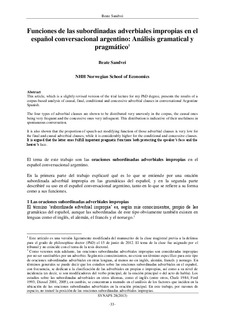| dc.contributor.author | Sandvei, Beate | |
| dc.date.accessioned | 2016-06-23T10:29:44Z | |
| dc.date.available | 2016-06-23T10:29:44Z | |
| dc.date.issued | 2013 | |
| dc.identifier.citation | SYNAPS - A Journal of Professional Communication 28(2013) | nb_NO |
| dc.identifier.issn | 1893-0506 | |
| dc.identifier.uri | http://hdl.handle.net/11250/2393840 | |
| dc.description.abstract | This article, which is a slightly revised version of the trial lecture for my PhD degree, presents the results of a corpus-based analysis of causal, final, conditional and concessive adverbial clauses in conversational Argentine Spanish.
The four types of adverbial clauses are shown to be distributed very unevenly in the corpus, the causal ones being very frequent and the concessive ones very infrequent. This distribution is indicative of their usefulness in spontaneous conversation.
It is also shown that the proportion of speech-act modifying function of those adverbial clauses is very low for the final and causal adverbial clauses, while it is considerably higher for the conditional and concessive clauses. It is argued that the latter ones fulfill important pragmatic functions both protecting the speaker’s face and the hearer’s face. | nb_NO |
| dc.language.iso | spa | nb_NO |
| dc.publisher | NHH | nb_NO |
| dc.title | Funciones de las subordinadas adverbiales impropias en el español conversacional argentino: Análisis gramatical y pragmático | nb_NO |
| dc.type | Journal article | nb_NO |
| dc.rights.holder | This article is in Spanish! | nb_NO |
| dc.source.pagenumber | 33-50 | nb_NO |
| dc.source.journal | SYNAPS - A Journal of Professional Communication | nb_NO |
